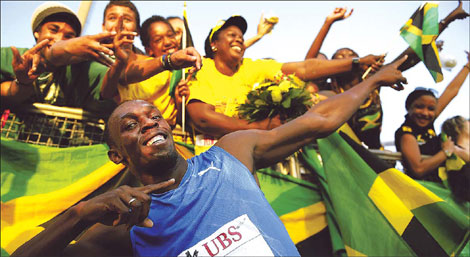Top News
Jamaica: A nation born to run
By Tym Glaser (China Daily)
Updated: 2011-05-22 08:33
 |
Large Medium Small |
|
 Jamaican sprint star Usain Bolt celebrates after winning the 100 meters during the IAAF Diamond League meeting, on July 8, 2010, at the Olympic stadium in Lausanne, Switzerland.[Photo/Agencies] |
If you are the big, big tree We are the small axe Ready to cut you down - Small Axe - Bob Marley
The harder you look at Jamaica's disproportionate success in sprinting, the more difficult it becomes to fathom or explain.
Just how does this sun-drenched but also severely troubled island in the Caribbean, which could fit into the area of Beijing with plenty of room to spare, keep producing some of the fastest people to ever run on this blue orb of ours?
Using the Olympics as an obvious benchmark, Jamaica has won 55 medals since it made its Games debut in London in 1948.
Arthur Wint set the wheels churning by claiming the 400m gold at those post-war Olympics and the country has hardly looked back since while producing world-class stars like Herb McKenley, George Rhoden, Lennox Miller, Donald Quarrie, Bertland Cameron, Merlene Ottey, Grace Jackson, Juliet Cuthbert, Deon Hemmings and now, during its "golden age", the likes of Asafa Powell and Veronica Campbell-Brown (who both scorched in Shanghai at last week's Diamond League meet), reigning Olympic and world women's 100m champion, Shelly-Ann Fraser, Beijing Games 400m hurdles winner Melaine Walker and, lest we forget, the fastest man to ever lace 'em up, Usain Bolt, the world record holder in both of the short sprints.
Even two of Jamaica's leading track and field commentators struggle to explain why such a small place has such large success in this particular field.
Radio host and track and field nut, Leighton Levy, outlines a myriad of reasons for Jamaica dominating the sprints now; while Cuthbert, who won the 100m and 200m silver medals at the 1992 Olympics in Barcelona, hinges her argument largely on genetics.
"Jamaica's athletic prowess is a combination of genetics, nutrition and environment," said Levy.
"The genetics are already known; our gene pool originates from the West African coast which, in layman's terms, predisposes us to developing fast-twitch fibers which give us the ability to run fast. However, genetics alone isn't the answer," he said.
"The yams, that are a staple in most of the rural areas that many of our best athletes come from, are said to possess steroidal properties that help us to build muscle.
"This, along with the hilly terrain and the fact that we run for everything.
"We run to school because we are always late; we run to play, we run everywhere. 'Run to the shop and get me some flour', is a phrase many children hear. We spend our whole lives running; running to something, away from something - running from poverty in many instances," he said.
Cuthbert supports the African roots part of Levy's argument.
"I say it is genetics. We came from different parts of Africa (via the slave trade) and then mixed with other people here," she said from her home in Kingston.
"Also, you have to understand we have a strong primary school tradition which identifies talent at an early age and that flows through to the Boys and Girls Athletics Championships."
'Champs' is held at Kingston's National Stadium over four days each year and brings the best high school athletes together; it's where all Jamaica's best young athletes cut their teeth.
It is school versus school and star versus star in front of crowds that can reach more than 30,000 on the final day of the event.
"All this takes us to Boys and Girls Champs where we hone our athletic talent and develop our keen sense of competition," said Levy. "Champs is the crucible at which our athletic talent manifests itself."
Cuthbert concurs.
"Champs is hugely important to a young athlete's development. It is simply the biggest event of the sporting year here and can get the best into US colleges."
Cuthbert won a scholarship to the University of Texas and is a great proponent of the US college system; despite the fact some elite Jamaican athletes are training with well-established clubs in their own island now.
"I will always endorse the value of a good education. Sure, you can make money while running, but what happens when your limited athletic career ends? You have to have a good education."
Levy agrees to a degree.
"In the past, getting scholarships to American colleges was crucial for many kids looking for a way out and go away and go on to a better life," he said.
"However, Powell and Bolt have now shown that one can stay home and get the best coaching, attend college and have a successful athletic career, make lots of money and drive fancy cars.
"So the motivation may be different, but the foundation is always there. The reasons why we run always comes back to the basic idea of trying to escape from the things that make us unhappy and unfulfilled."
Born to run...indeed.
Tym Glaser is a sports copy editor who lived in Jamaica for 14 years and only got slower. He can be contacted at tymglaser@hotmail.com
| 分享按鈕 |